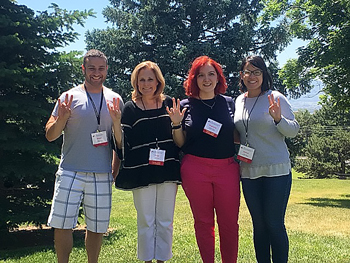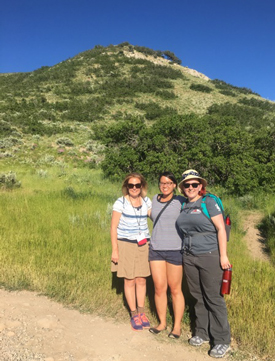Student & Faculty News
'The Utah Experience'
UHCOP Team Learns About Alcohol, Drug Dependency Issues at APhA Institute in Salt Lake City
A team from UH College of Pharmacy traveled to Salt Lake City, Utah, to get an in-depth look at issues surrounding alcohol and drug dependency and the role pharmacists can play in breaking the cycle of addiction, including use of life-saving overdose intervention medications.
Pharm.D. students Shawn Ahmad, Stephanie Crowley and Chelsea Jose, along with Assistant Dean of Student & Professional Affairs Paige Pitman, Pharm.D., MBA, B.S. ('94), R.Ph., participated in the American Pharmacists Association Institute on Alcoholism and Drug Dependencies.

APhA launched the inaugural session of the APhA Institute on Alcoholism and Drug Dependencies in June 2015. The institute continues to carry the message forward to provide pharmacists, student pharmacists, and the profession with resources, information, motivation, and guidance regarding the implementation or strengthening of state and campus-level programs to help pharmacists/student pharmacists whose competence to perform their responsibilities has become impaired due to chemical dependency or other causes.
The institute assists individuals in finding treatment, support them in ongoing recovery, and facilitate reentry into pharmacy practice or pharmacy education. Institute programming provides attendees with the latest methods and techniques for working effectively towards this purpose. The institute also strives to provide a perspective for those who would like to understand addiction even if they have not experienced it themselves.
"The institute provided me with information that I could use to better understand the battle with addiction some of my loved ones have faced," Crowley said. "I also wanted to be able to bring back knowledge and ideas on how we could incorporate recovery into Generation Rx (a national and local initiative of the APhA-Academy of Student Pharmacists to reduce and prevent prescription drug abuse). Improving methods of opioid and heroin abuse prevention is a hot topic right now, so I feel that this conference helped prepare me for my future as a pharmacist.

"I learned better ways to utilize the Prescription Drug Monitoring Program, the new Texas Naloxone laws, and much more. Katrina Watson, our UHCOP APhA-ASP chapter president, and I have already discussed putting together a fundraiser to help future students attend next year. APhA Institute is more than just a conference; it is truly an inspirational experience."
Fellow institute attendee Jose, who also serves as senior chair of the UHCOP APhA-ASP Chapter's Generation Rx projects, added that the institute curriculum provided emotional reminders of the role of all healthcare providers to those suffering from dependencies and addiction.
"I met many kind-hearted people and learned about many things such as how prescribing naloxone to people with a high risk for misusing/abusing opioids should be encouraged, how addiction can change the brain's pathways, ;how families can be affected by substance misuse and/or abuse, and most importantly, how crucial it is to have a strong support system when trying to overcome an addiction.
"I realized that almost everyone has been impacted by addiction in some way, shape or form. Addiction is a disease that can easily affect any one of us. It is important for us to recognize that before we are quick to judge others. Together, we can break the stigma of addiction by offering a hand to those who seek it."
The program also included participating in sessions of Alcoholics Anonymous and Narcotics Anonymous.
"When people shared their stories, it was very touching and cathartic; I saw their bravery, their honesty, their perseverance, and how caring they were among other positive attributes," Jose said. "It was inspiring to learn what they went through and to see how strong they are. I learned that people do not have to do things or go through things alone."
The program's origins date back to 1951 with the establishment of the University of Utah School on Alcoholism and Other Drug Dependencies, which began providing a pharmacy-specific curriculum in 1983. The APhA Institute stepped in to continue offering the program for pharmacists and pharmacy students in 2015 when the annual program was discontinued by the founding institution.